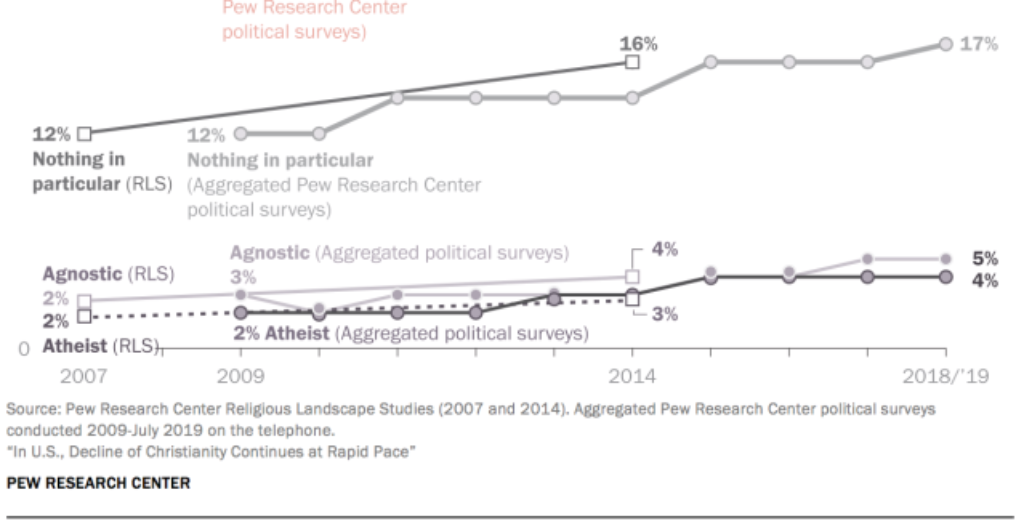Demography is destiny: the idea that population trends and distributions determine the future of a region, nation, or a planet. If it’s true, then it’s good news for atheists, agnostics, and those who answer “Nothing in particular'' when asked about their religious affiliation.
The phrase has only been around for 50 years*, not really enough time to know if it works for some of the big questions such as, “Are we overpopulating the planet and how will that turn out?” Some Democratic leaders are relying on demography to increase the number of Democratic voters as the Latino population grows, but the theory failed politically in some areas of Florida and Texas last fall. Destiny may be too strong a word but the idea can’t be ignored.
The most reliable study on the religious makeup of the United States is The Pew Research Center’s 2019 report on religion. It shows the changing religious landscape and the increase in secular Americans. Specifically it shows that from 2009 to 2019 the percentage of atheists increased from two percent to four percent and the percentage of agnostics increased from two percent to five percent. The percentage of those who said their religious beliefs are “nothing in particular'' (the “Nones”) grew from 12 to 17 percent. So the combined total of atheists, agnostics, and Nones is 26 percent. And if you look at specific answers from the Nones, a large number sound like atheists and agnostics even if they don’t officially identify themselves that way. Finally, the growth in secularism is by far the greatest among young Americans. The demographics are on our side.
Twenty-six percent is a significant number and a significant voting bloc. It’s a number that I try to work into conversations on Capitol Hill because not many people there are aware of it. It is definitely not a number that is representative of the official breakdown of religious affiliations reported by Members of Congress. According to the Pew Research Center, out of 435 House Members, 420 give a specific religious affiliation, 14 were “unknown/refused to state”, and one, Congressman Jared Huffman (D-CA), says he is a humanist. He is also a co-founder of the Congressional Freethought Caucus and a reliable supporter on secular issues. But clearly the House of Representatives does not represent the nation’s religious views.
Now, the truth is that there are other Members, of both parties, who are in fact humanists, atheists, or Nones, but for political reasons don’t say so. That’s the common wisdom; you won’t get reelected if you are unaffiliated. But common wisdom is not always true. The more we let our Representatives know what their voters really look like demographically, the easier it is for them to support secular policy and still win elections. If you have a chance to do so, let your legislators know about the results of the Pew study.
With more Members of Congress supporting secular issues, it will be easier to fight bills like H.R. 5480, the poorly named “Protecting Religious Exemptions from Vaccine Mandates Act.” This bill was introduced in the House last week by Congressman Ron Estes (R-Kansas) and would allow religious exemptions to the White House's new vaccine requirements for federal employees, many healthcare workers, and employees at large companies. This bill is the latest effort by legislators and the courts to misuse the Religious Freedom Restoration Act (RFRA) in ways that contradict the original intent of the law, and to use religion as a means to harm people through federal policy.
Vaccines work, people need to be vaccinated to protect others as well as themselves, and the pandemic meets the legal standard for a compelling national interest so there should be no religious exemptions. This bill is a shining example of why we are also advocating for Congress to pass the Do No Harm Act which would clarify the original intent of RFRA so it is clear that RFRA can’t be used to justify ideas like this.
*The phrase “Demography is destiny” has often been ascribed to 19th century French philosopher Auguste Comte, but in the age of Google and scanned 19th century books there is no evidence that he ever said it. The first documented use of the phrase is in the 1970 book "The Real Majority" by Richard Scammon and Ben Wattenberg, about politics and changing demographics. Demography may be destiny but getting credit for a clever phrase is not always assured if you’re up against a 19th century philosopher.


